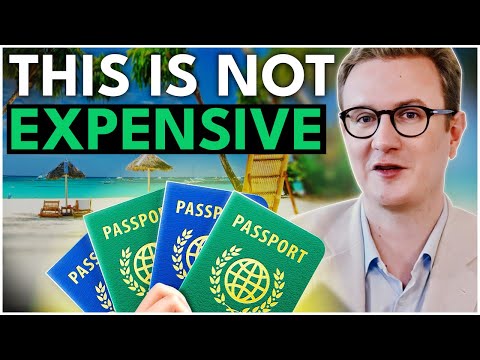- Home
- Articles
- Global Citizen
- The Top 8 Citizenships of the Richest People in the World
The Top 8 Citizenships of the Richest People in the World
February 14, 2025
The rich are getting second passports.
In 2025, the world’s wealthiest individuals like Elon Musk, Larry Ellison and Jeff Bezos dominate not only in net worth but also their choice of citizenship.
Elon Musk, for instance, holds US citizenship but originally hails from South Africa, while Larry Ellison and Jeff Bezos are proud US citizens.
Interestingly, many of these billionaires hold second citizenships, enhancing their global mobility and securing additional financial and lifestyle benefits.
This trend reflects a broader strategy among high-net-worth individuals (HNWIs) as more and more seek economic and political freedom through second citizenship.
Popular destinations for acquiring such statuses include economic powerhouses and lifestyle havens.
The top eight countries where HNWIs often obtain second citizenships include places like Malta, Monaco and St Kitts and Nevis.
These nations offer attractive investment opportunities and a welcoming environment for those looking to expand their global footprint.
Want to do the same and learn how to go where you’re treated best?
Nomad Capitalist can cater to all your citizenship needs. We help HNWIs acquire citizenship all around the world.
For some inspiration regarding where to go, here are the top eight citizenships of the richest people in the world.
8. New Zealand Citizenship
Entrepreneurs and investors favor New Zealand because it is one of the most accessible jurisdictions to conduct business in.
A stable democracy has led to a thriving economy. Although there is no formal citizenship-by-investment scheme, immigration authorities will deal with particular applications.
PayPal co-founder Peter Thiel, who currently has a net worth of US$4.4 billion, became a New Zealand citizen in March 2011.
New Zealand law confirms that the Minister of Immigration can approve a citizenship application if it ‘would be in the public interest because of exceptional circumstances of a humanitarian or other nature’.
Thiel, therefore, bypassed the requirement to spend 146 days a year in New Zealand by making ‘significant investments’ in the country’s economy.
7. Canadian Citizenship
Tariffs and trade wars with Trump notwithstanding, HNWIs are drawn to Canada because of its political security, quality of life and resilient economy.
Famous Canadian immigrants include Alexander Graham Bell, the telephone inventor, who relocated there from Scotland in the late 1800s.
More recently, Mike Lazaridis, who pioneered the Blackberry, immigrated to Canada from Turkey along with Shopify founder Tobias Lütke, who moved from Germany.
Canada’s Start-up Visa Program accepts applications from innovative immigrant entrepreneurs who can start companies in the country that can compete on a global scale and create jobs for Canadian nationals.
The Province of Québec also runs a business immigration program. Entrepreneurs, investors and self‐employed workers are all eligible.
6. US Citizenship
US immigration law offers a Green Card to employment-based preferred immigrants.
These are non‐citizens who have invested or can demonstrate proof of intent of investing US$1,050,000 in a new commercial enterprise that will benefit the US economy and create at least ten full-time positions for qualifying employees.
These HNWIs are also called ‘EB-5 immigrant investors’ because they are in the employment-based fifth preference visa category.
Plenty of household names have made a new life in America. These include Australia’s Rupert Murdoch, Germany’s Levi Strauss and Russia’s Sergey Brin.
Despite the threat of an emergent China, the US still enjoys the position of the world’s largest economy, so it makes sense that so many of the world’s wealthiest people live there.
However, the unique nature of America’s citizenship-based taxation system – which you don’t even need to be a citizen to get trapped in, by the way – means that more and more Americans are approaching our company to help them move offshore.
5. Australian Citizenship
With a net worth of US$7.38 billion, Sydney-based businessman Frank Lowy has come a long way – Australia, to be exact.
During World War II, he lived in a Hungarian ghetto, but since then, he’s made a series of moves in the business and citizenship worlds.
As chairman of the Westfield Corporation, he has overseen the establishment of over 80 shopping centres worldwide.
Admittedly, Australia isn’t one of our favourite destinations right now, but it does have several working and skilled visas. These include Business Innovation and Investment, Business Owner, Global Talent, and Investor Visas.
The latter costs a minimum of AU$2,890, and you must have held a designated investment of AU$1.5 million for four years.
4. Swiss Citizenship
A Swiss passport is among the world‘s strongest, guaranteeing visa-free, visa-on-arrival or eTA (electronic Travel Authorisations entry to 174 countries, including Europe’s Schengen countries and the USA.
While Switzerland is popular primarily for its banking services, as a Swiss citizen, you can freely live and work in the EU.
There is no fast‐track citizenship-by-investment scheme in Switzerland because, frankly, the country doesn’t need to incentivise investment. Still, it does offer generous tax breaks for wealthy individuals.
Naturalisation is possible after ten years of residency, so there are much faster options in the region, most notably Malta, where you can get citizenship in a year.
3. St Kitts and Nevis Citizenship
In 1984, St Kitts and Nevis revolutionised the world of investment migration by offering the first citizenship by investment scheme.
Benefits include tax-free residence as you are not taxed on your income or wealth on the islands.
While other Caribbean jurisdictions like the Cayman Islands tend to steal the spotlight, St Kitts and Nevis has more to offer for HNWIs, with fast and affordable citizenship by investment, making it an ideal second passport option.
The country is also a leading jurisdiction for offshore trusts, making it a popular choice for those looking for robust asset protection.
2. Monaco Citizenship
In terms of sheer concentration of wealth and glamour, few countries can compete with Monaco.
Located on the French Riviera, this tiny nation enjoys a warm climate and a stunning coastline. But the principality is about so much more than sunshine and scenery.
Monaco, after all, is the original home of the jet-set, from its own royal family to international celebrities – not to mention being the original stomping ground of 007, James Bond.
The streets of Monte Carlo also serve as the backdrop for the annual Monaco Grand Prix, hands down the most prestigious event in motorsports.
But of course, sunshine and luxury aren’t the main reasons why the super-wealthy choose to live in Monaco (plenty of other countries offer that, too).
No, Monaco is so popular mainly because, unlike many low-tax countries, which are often mislabeled as such, it’s a true tax haven. As a resident of Monaco, you pay zero income tax – hence the appeal.
One thing that Monaco doesn’t have in its favour, however, is that, despite its location in the south of Europe, it’s not an EU member state, which is exactly why our next country scores higher.
Another factor that makes Monaco less attractive is that it doesn’t recognise dual citizenship.
1. Maltese Citizenship
For those who hate to compromise, Malta offers it all. If you want the very best for you and your family, then Maltese Exceptional Investor Naturalisation (MEIN) is the best option available.
Sure, you can get Caribbean citizenship by investment for a fraction of the cost, but Malta offers fast-track EU citizenship in a year, which can then be extended to your family members.
This means that once attained, you are free to live and work anywhere in Europe. Plus, your children are also eligible to study at any of Europe’s most prestigious universities.
A Maltese passport grants you visa-free access to 172 countries, greatly enhancing your travel freedom.
The thing is, once you’ve attained your Maltese citizenship, you may well decide to stay put, as many wealthy people tend to do since the country ticks a lot of boxes.
It’s an English-speaking country that’s quaint yet cosmopolitan, with a vibrant expat community and year-round sunshine.
Entrepreneurs interested in offshore company formation, meanwhile, should definitely investigate Malta’s tax breaks.
Or better yet, get in touch with us, and we’ll show you the most tax-efficient way to combine all of the elements above as part of a custom-made Action Plan.
The Top 8 Citizenships of the Richest People in the World: FAQs
The list of the richest people in the world changes almost daily as net worths fluctuate. However, among the five richest people in the world are Elon Musk (United States and South Africa), Larry Ellison (United States), Jeff Bezos (United States), Mark Zuckerberg (United States) and Bernard Arnault (France).
As you can probably imagine, the world’s wealthiest billionaires own several homes around the world. Notably, the world’s four richest people, Elon Musk, Jeff Bezos, Larry Ellison and Mark Zuckerburg, are primarily based in the United States.
World Population Review reveals that more than 2,700 billionaires are dotted around the world. Over 25% of the world’s billionaires reside in the United States. That means there are 724 US-based billionaires.
You will find the most millionaires per capita in the United States of America. There are around 24.5 million millionaires. That’s just under 39% of the world’s total. Wherever you choose to acquire a new citizenship, you are moving towards greater financial freedom. We can help you on your journey.
The world record for the most citizenships is unofficially held by an individual with citizenship in eight countries: Canada, the UK, Ireland, Belize, Grenada, Dominica, St Kitts and Cape Verde.
Jeff Bezos is American. He was born in Albuquerque, New Mexico in 1964.
Do You Need Second Citizenship?
While the answer ultimately depends on your personal, financial and professional goals, most high-net-worth individuals can benefit from a second passport.
After all, the world is becoming increasingly interconnected, and holding a second citizenship is more than just a luxury; it’s a strategic asset that unlocks global mobility, allowing you to navigate borders with ease.
It opens doors to new financial opportunities, from favourable tax regimes to diverse investment possibilities, and offers a safety net in times of political or economic instability.
More than ever, personal freedom is about having choices, and second citizenship empowers you to live, work and thrive where you are treated best.
Ready to explore the possibilities of broadening your horizons? Discover how Nomad Capitalist can help you unlock a world of benefits to protect your assets and optimise your wealth. Learn more about our tailored services today.

Latvia Real Estate Investment for Expats: Eligibility, Taxes, and Benefits
Purchasing real estate in Latvia is a popular investment strategy for wealthy expats seeking affordable property ownership opportunities that may lead to Latvian residency. The country is known for low investment requirements, minimal restrictions on foreign property ownership, and low property tax rates. In this guide, we will explain the rules for buying Latvia real […]
Read more
Mauritius Residency Requirements 2026: A Complete Guide
Thanks to its favorable tax policies, political stability, and a relaxed and family-focused lifestyle, Mauritius is one of the premier relocation destinations for high-net-worth individuals. You can get Mauritius residency through one of several residency programs, including those aimed at business and property investors. In this article, we’ll explain the Mauritius residency requirements for each […]
Read more
UAE Golden Visa: Requirements, Application Process, and Advantages Explained
The UAE Golden Visa allows high-net-worth expats to invest, work in, and relocate to the Emirates while benefiting from its zero-tax system and high living standards. There are several paths to the Golden Visa, and understanding which one is right for you can make a significant difference in your residency process. In this guide, we’ll […]
Read more




